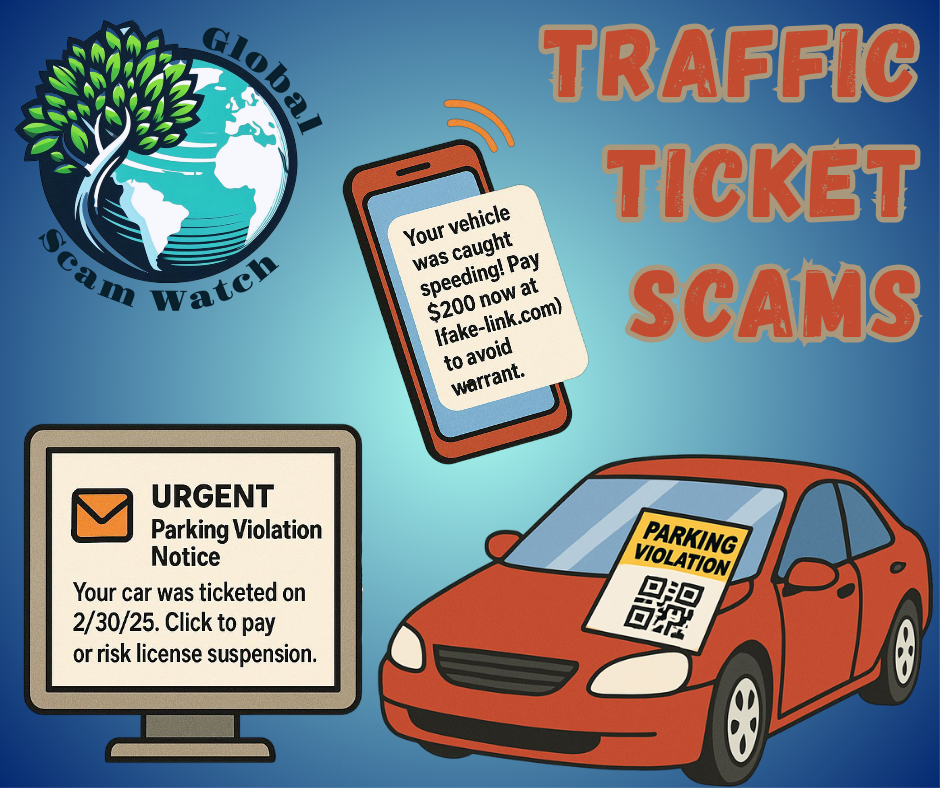
Fake traffic fine notices are on the rise. Once seen mostly in the United States, similar scams are now appearing in Canada, the United Kingdom, and Australia. These schemes rely on urgency and fear, convincing drivers to pay quickly before checking if the fine is real.
🔎 How the Scam Works
Scammers send text messages, emails, or fake notices claiming to come from government agencies or toll operators.
The messages claim you have an unpaid traffic fine and warn of serious consequences if you do not pay immediately. Common threats include:
- 🚫 Your account being “flagged” in a violation database
- 🚗 Being denied license or vehicle registration renewal
- 💸 Additional fees or penalties being added
- 🕵️ Your account being placed “under review”
- 🏁 You were speeding in a school zone
The message always includes a link or QR code to make payment. That link leads to a fake website designed to steal money and personal details.
📄 Example of a Scam Message
ICBC – Traffic Ticket Notice
Our records show that you have an unresolved traffic fine linked to your driving account.
If this remains unpaid after August 30, 2025, the following service restrictions may apply:
- Record status will remain flagged in the violation database
- Renewal of your vehicle registration may be denied starting August 30
- Driver's licence renewal may be temporarily restricted
- Additional administrative fees may apply
- Your account may be subject to further review
Action Link:
https://xxxxxxxxxxxxxxxxxxxPlease complete the payment before August 30 to avoid service disruption.
(Reply Y and re-open this message to click the link, or copy it to your browser.)
🚗 QR Code Tickets on Car Windows
Some scammers are moving beyond digital messages. Drivers have reported fake parking or traffic tickets placed directly on their car windows. These slips look official and include a fine amount along with a QR code for immediate payment.
Scanning the code leads to a fraudulent website.
⚠️ Signs of a fake QR code ticket:
- No ticket number or clear violation details
- Poor printing or unusual formatting
- Payment demanded only through QR code
- No option to contest or appeal
✅ Real tickets always have official documentation, clear payment instructions, and can be verified through the official government or city website.
🌍 How It Is Showing Up Internationally
🇨🇦 Canada
Scammers impersonate provincial transport ministries and toll operators. Texts include deadlines and fake “action links” to trick people into paying by credit card or e-Transfer.
🇬🇧 United Kingdom
Fraudulent DVLA-themed messages direct drivers to fake GOV.UK websites. Victims are told they must pay immediately to avoid “court action.”
🇦🇺 Australia
SMS messages pretend to come from state road agencies or toll operators. Victims are pushed to pay using BPAY or PayID, which real agencies do not use for fines.
🇺🇸 United States
Messages impersonate DMVs and toll services such as E-ZPass or SunPass, often claiming drivers missed a toll or failed to resolve a violation.
⚠️ Red Flags to Watch For
- Messages received by text or email instead of official mail
- Threats of immediate license suspension or blocked renewals
- Requests for unusual payment methods (e-Transfer, PayID, BPAY, cryptocurrency, gift cards)
- Links or QR codes that do not match the real government website
- Lack of violation details such as ticket number, date, or appeal process
✅ How to Stay Safe
- Always verify fines directly on the official government or toll operator website
- Never click payment links in texts or emails — type the website manually
- Contact your local licensing or toll authority if you are unsure
- Report suspicious messages
📱 Reporting Scam Texts
- In Canada, United States, United Kingdom, Australia, New Zealand, and Ireland, you can forward scam texts to 7726 (SPAM). This helps mobile carriers investigate and block fraud.
- In other countries, report to your local telecommunications authority or consumer protection agency.
🚔 If You Have Already Paid
- Contact your bank or card provider immediately
- Report the crime to your local police
- Notify your national fraud reporting agency (such as the Canadian Anti-Fraud Centre, Action Fraud UK, or the FBI Internet Crime Complaint Center in the USA)
📌 Bottom Line
Whether it is a fake SMS, a QR code ticket on your windshield, or an email impersonating a government agency, the scam is always the same: pressure you to pay quickly before you can confirm if the fine is real.
Always double-check with official sources before sending money because once it is gone, recovery is extremely difficult.
- Log in to post comments
